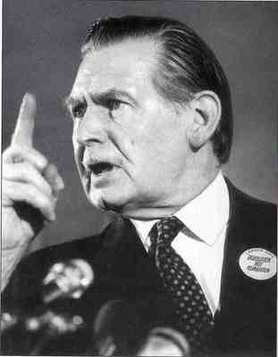Willie Ross, Baron Ross of Marnock facts for kids
Quick facts for kids
The Lord Ross of Marnock
|
|
|---|---|

Ross giving a speech during his parliamentary career
|
|
| Secretary of State for Scotland | |
| In office 4 March 1974 – 8 April 1976 |
|
| Prime Minister | Harold Wilson |
| Preceded by | Gordon Campbell |
| Succeeded by | Bruce Millan |
| In office 16 October 1964 – 19 June 1970 |
|
| Prime Minister | Harold Wilson |
| Preceded by | Michael Noble |
| Succeeded by | Gordon Campbell |
| Shadow Secretary of State for Scotland | |
| In office 19 June 1970 – 4 March 1974 |
|
| Leader | Harold Wilson |
| Preceded by | Gordon Campbell |
| Succeeded by | Alick Buchanan-Smith |
| In office 7 December 1961 – 16 October 1964 |
|
| Leader | Harold Wilson |
| Preceded by | Tom Fraser |
| Succeeded by | Michael Noble |
| Member of Parliament for Kilmarnock |
|
| In office 6 December 1946 – 7 April 1979 |
|
| Preceded by | Clarice Shaw |
| Succeeded by | William McKelvey |
| Personal details | |
| Born | 7 April 1911 Ayr, Scotland, United Kingdom |
| Died | 10 June 1988 (aged 77) Ayr, Scotland, United Kingdom |
| Political party | Labour |
| Spouse | Elizabeth Aitkenhead |
| Children | 2 daughters |
| Alma mater | University of Glasgow |
| Profession | Teacher |
William Ross, Baron Ross of Marnock (7 April 1911 – 10 June 1988) was an important Scottish politician. He was a member of the Labour Party. He holds the record for being the longest-serving Secretary of State for Scotland. This is a top government job in Scotland.
Ross held this role twice. First, from 1964 to 1970, and then again from 1974 to 1976. Both times, he served under Prime Minister Harold Wilson.
Contents
Early Life and Military Service
William Ross was born in Ayr, Scotland, on April 7, 1911. His father was a train driver. William went to Ayr Academy and then studied at the University of Glasgow. After finishing his education, he became a schoolteacher.
Before World War II, he joined the army. He served in the Highland Light Infantry. He was stationed in places like India, Burma, and Singapore. Later, he became a major in Lord Louis Mountbatten's team in Ceylon (now Sri Lanka). He even guarded Rudolf Hess, a famous German figure. In 1945, he was given the Order of the British Empire award for his service.
Political Career
Becoming a Member of Parliament
After the war, Ross decided to enter politics. He first tried to become a Member of Parliament (MP) for Ayr Burghs in 1945 but did not win. However, in 1946, he won a special election for the Kilmarnock area. He then became the MP for Kilmarnock.
As an MP, he worked closely with Hector McNeil, who was also Secretary of State for Scotland. In 1954, Ross tried to change a law about TV adverts. He wanted to ban commercials on Sundays, Good Friday, and Christmas Day.
Secretary of State for Scotland
From 1962, Ross was the Labour Party's main spokesperson for Scottish affairs. This role is called the Shadow Secretary of State. In 1964, when the Labour Party won the election, he became the actual Secretary of State for Scotland. He held this job until 1970.
The Conservatives were in power from 1970 to 1974. When Labour won again in 1974, Ross returned to his role as Secretary of State. He stayed in this position until 1976, when Prime Minister Harold Wilson resigned.
During his time as Secretary of State, Ross helped create important organizations. These included the Highlands and Islands Development Board and the Scottish Development Agency. These groups helped improve the economy and development in Scotland. Today, they are known as Highlands and Islands Enterprise and Scottish Enterprise.
Views on Scotland's Future
William Ross was a strong believer in the United Kingdom. He wanted Scotland to remain part of the UK. He was against devolution, which is when a central government gives more power to local governments.
In 1975, there was a vote on whether Britain should stay in the European Community (EEC). Ross campaigned for Britain to leave the EEC. He was also known for his strong dislike of the Scottish National Party (SNP). He famously called them "Tartan Tories." This nickname is still sometimes used today. Because of his strong opposition to the SNP, he was nicknamed "the hammer of the Nats."
Later Life and Legacy
William Ross continued to represent Kilmarnock as an MP until 1979. After leaving the House of Commons, he was made a life peer. This meant he became a member of the House of Lords and was known as Baron Ross of Marnock.
He was also involved in other important roles. From 1978 to 1980, he was the Lord High Commissioner to the General Assembly of the Church of Scotland. In 1978, he became the Honorary President of the Scottish Football Association.
Ross married Elizabeth Jane Elma Aitkenhead in 1948. They had two daughters. He passed away from cancer in 1988. His wife, Lady Ross, lived until 2018.
Images for kids
 | DeHart Hubbard |
 | Wilma Rudolph |
 | Jesse Owens |
 | Jackie Joyner-Kersee |
 | Major Taylor |


